HipoTesis is an experimental periodical publication conceived in late 2009 by Fernando Nieto, Katerina Psegiannaki and Francisco Triviño. In the words of its creators, HipoTesis reflects and developes upon “an indefinite theoretical concern, mainly focused on the field of architecture, but eager to be nourished by other disciplines such as philosophy, pedagogy, art or sociology”.
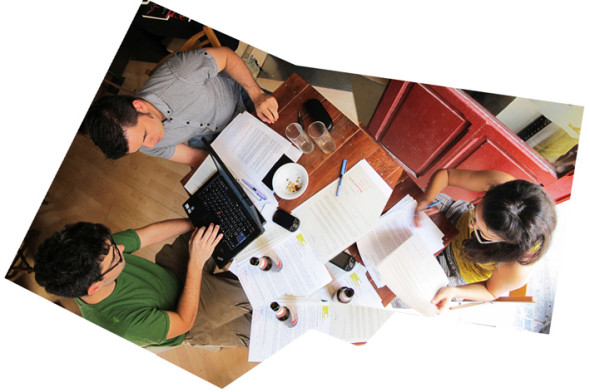
Launched online in January 2010, HipoTesis has been one of the first architectural magazines to explore collage, commentary, ramdomness, assembly and play under the frame of the emerging practices in writing, reading and socializing linked to ICT development and the rise of social networks. The work of HipoTesis converges with the exploration route opened in recent years by various capsule-magazines in architecture and culture –such as Engawa, Bipublications or From Spam to Maps– with the uniqueness of venturing into an editorial process that emphasizes collective construction and that presents an important handcrafted component. To celebrate the newly launched Hipo N, the third issue of a fruitful collaboration with Pedagogías Invisibles, whose contributors will meet on May 16 at a party in Matadero, we conducted the following interview:
HipoTesis has two series, a numbered and an alphabetical one, what are the differences?
The Alphabetical Series presents latent reflections which are still opened and in need of feedback to ensure their fertility, and that are not yet bound to any specific topic, at least it is not predefined in advance. The other series, the Numerical one, consists of reflections that require a more extensive layout to be developed comfortably. It is a pre-referenced series, and due to that, the format is more rigorous and the topic is fixed, primarily guided by our affections. Let’s say that this series belongs to another battleground, one where the time of action and reading is slower.
The Alphabetical Series do not present a common topic, there is a cross-linking of the super-productions stemming from the individual affections of each us, meanwhile in the Numerical Series the subjects arise and emerge from our own fondness for production (from HipoTesis), from the things that we have not yet achieved, that we strive for and that differentiate us at the same time. We enjoyed profoundly Eloy Fernández Porta’s book, “Eros. La superproducción de los afectos”. At the end of the day there is a lot of love involved in all of this…
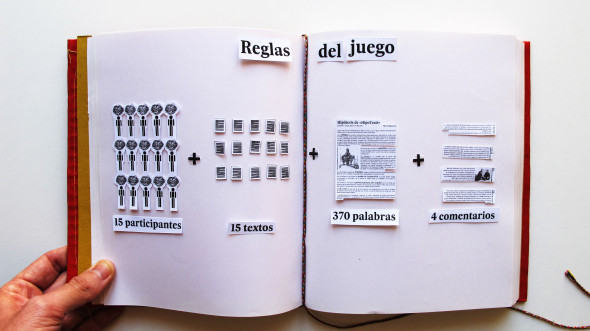
Could you explain HipoTesis’ editorial protocol? I’m curious about what motivated you to devise and implement a process of this kind —a part from love.
The protocol is rather similar to a trading game: each participant is required to comment on four of the texts that will be published in the same issue as theirs, and in exchange their text will be also discussed by other four contributors. The method requires a process of synthesis performed by the participants, so as to ration their effort. We encourage purposeful reflections, and in this sense we find it interesting to use references in the form of quotes, texts or authors that bring more to the table or help contextualize what has been said. In the game we act as DJs, mixing contributors who are unaware of the identity of the other participants in play; we work with anonimity in order to avoid prejudices and to obtain more interesting results.
Our main motivation is to recover the communicative drive that, in our opinion, has been partly lost in the field of academic research. On the other hand, it is also important for us to understand the magazine as a resource for sharing the interests we have in common as weel as the works of specific authors that somehow have helped us understand these interests. The game of being read by a stranger who is in the same situation of advantage or disadvantage in the publication is also key to our motivation. We often read well-known authors and disregard outsiders, but an aninomous author and a few chosen key words can trigger thoughts that a well-known author’s reflections cannot offer.
This editorial process that begins via email and finally results in a digital output, presents a meticulous handcrafted dynamic, which to me implies a sort of criticism to the habitual procedure of academic and scientific journals, often very fragmented and rigid…
That’s right; we use the digital world as a platform, as the place where the established procedures are carried out; but apart from that, our regular procedure is purely handcrafted. As mediators, we read the received texts and decide how to organise the exchange among the participants. We go one by one, without using any software that relieves us from the speculations that arise from the intersection of information, as this is precisely what interests us most.
HipoTesis is often linked to university groups and allied individuals, seeking to form a rich network for its creators and participants, but it opens a more liberated and suggestive path than the one imposed by current scientific journals. The landscape of publishing today sometimes seems like a dream that repeats itself again and again. Although it boasts a versatile and contemporary reality that is not unique, publications often offer a single-glance vision of the world, filtered by some authors and conditioned by identical circumstances. These cyclical dynamics is what we believe that can be interrupted by an exchange project based on the intellectual generosity of each one of us.
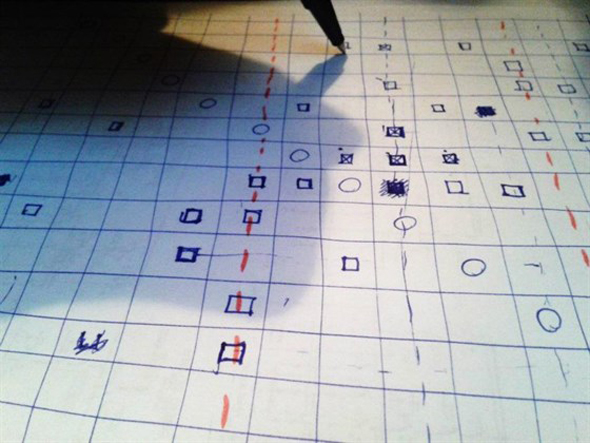
What role does chance and ramdomness play in HipoTesis? Do you allow yourself to break the rules of your own game?
Occasionally we “bend” or “modify” certain rules, for example we specifically enjoy to invite someone to insufflate some singularity, or as we did in the issues on pedagogy, we offer the contributors a large number of keywords, all of them unique and heterogeneous, and asked each player if they would or not use them. In this sense, we are very concerned with the heterogeneity of the target network that HipoTesis seeks to reach, because affections and results will predictably be heterogeneous as well. In fact, it sometimes embarrasses us a litttle bit to admit that we are architects, or that the editorial game was started by architects, as just by saying this we are classifying, and preventing certain people from other fields from taking part, people who could play a crucial role within the magazine.
Exceptionally, one of the issues that has interested us most is the theme-driven number “Hipo I: About Hands”. We believe it is powerful yet unique, open but also directed. This issue was an opportunity for us to focus on the special interest that has shuttled a regular issue under the Numeric Series.
This speculative assemblage somehow questions the idea of the publisher as mediator, bringing his or her labor to a kind of authorship; this is a perspective I’m personally very interested in. So, how do you see your role in the publication?
Sometimes our role as speculators is inevitable. Depending on the level of affection or interest a reflection may raise, we bring it together with others that might introduce some kind of conflict or support special situations through their comments. We act as speculators in these junctions, but when there is nothing further to be explored, when we do not come up with more possibilities for encounters to occur, we allow the protocol to unravel itself, and it is here that chance also plays a part. One of the architectural publications that interests us most is Fisuras, both as readers and in our role as editors. We have been very close to it during its production, taking good note of the ways of handling information, so the fact that playing with the layout can generate new information without actually adding any words. Fisuras has been capable of enclosing a dose of freshness in every issue, both because the topics and a formatthat still seems exciting to us.
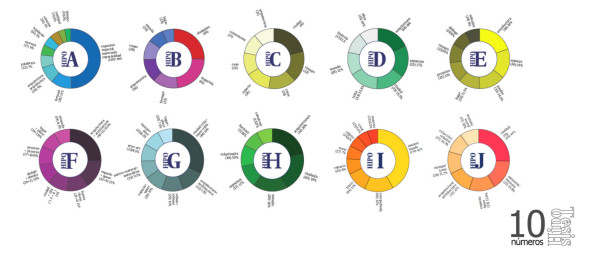
In a recent conversation, Miguel Villegas -editor at Arquitextonica– noted the distance that often exists between publications devoted to disseminating content and those committed to the production of knowledge, often linked to the academic world. If you had to position yourselves between these two poles, where would HipoTesis fall?
Interestingly enough we believe that knowledge really occurs when speculation on the selective diffusion of the contributors’ reflections takes place among the participants themselves. In this sense, what happens is that the boundaries between production and dissemination are diluted if we compare it to what happens in the field of scientific divulgation. HipoTesis as a publishing project could be situated in that space between ‘what’ and ‘how’, between generated knowledge and the ways of transmitting this knowledge to others.
Experimentation in methods of production and in the broadcast of knowledge has always been a starting premise for us. Despite this worn-out concept, we like to talk about the magazine as a “meta-investigation”, as it intends to delve upon modes and models of this binomial example of production-diffusion. We believe that, inside the project, knowledge lies within the realization of comments; it is then when someone actually starts to think and answer to what another has said. And this process of dialogue is what we have insisted on from the beginning. When considering the acquisition of knowledge as an active process, HipoTesis asks participants to comment on the thoughts of others, which becomes a compromise. The commitment of listening carefully, reflecting with respect, making the effort of understanding each other, connecting the thoughts of others with one’s own interests and then supplying one’s self-knowledge, which from that precise moment has been enriched. The best part is that encouraging participants to ask questions and making them doubt about the answers generates truly unexpected connections.
In contrast to the “normalized” regular academic journals, HipoTesis adds value through the attitude to knowledge it promotes, as it encourages interaction, making connections, becoming affected by what we read, or the urge for sharing, contrasting and discussing as valuable aspects in the production of knowledge.
Yes! Although seen in this light it may seem we act as an NGO for knowledge; maybe we are. We deliberately feed, enrich, pamper and try to increase the span of knowledge. In fact, one of the most interesting findings of this whole method was the process of staging the collective intelligence that one can find in any will to cooperate. The articles often remain open –consciously or not–, ready to be completed by commentators, as a sort of exquisite corpse that promotes unexpected and creative results. Moreover, we value certain aspects such as the opportunity to interact with people from many different areas and backgrounds, or to be trained in analytical reading.
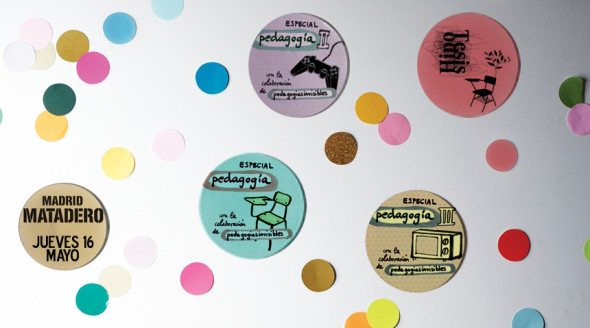
What other values are you interested in promoting with your project?
We think that the relation between content, process and layout is something crucial. An open format, which goes beyond an exhibitor, may allow the editor to display information that generates knowledge. However a researcher typically assumes more conventional layouts to present their reflections. That is, the format is also a “producing” element in the hand of the editor, whereas in the researcher’s instance it is exclusively a structure or canvas.
We believe that the play between format and content speaks affectionately of a publication. A layout –understood as something more than the size of a paper or the choice of a particular font– establishes a framework for a game based on reflections, and reaches beyond of what is written. This is why we value and we are interested (and we sometimes miss) in publications dealing with this issue, i.e., different ways of displaying an identical content.
Would you like to add something else?
Yes, there’s something we have spent time going back and forth upon, and it is that we are considering the idea of killing HipoTesis. Between suicide and a natural death, murder conveys a larger dose of emotion. There is something prior to the natural death of many magazines that is off-putting to us, when languishing nostalgically, issues become increasingly bland, readrs pay less attention and when reading the thought of its rich past is the only idea that comes to mind. On the other hand, the thought of suicide doesn’t excite us completely, because a radical experiment can trash a lot of what has been accumulated until today; besides, suicide would question whether the outcome of HipoTesis life has been entirely happy or not. So finally we believe that murder is the best way to go. We will announce it in advance to generate some interest, and Hipo Z seems like a good time for doing it. We still have to figure out the murder weapon and the type of crime, but we surely will. After death, an engineering of crime rises and this seems as exciting as life itself. We’ll see how this all is going to end!
Thank you very much HipoTesis, congratulations on your project and see you at the party!
